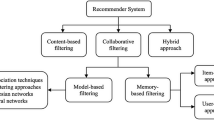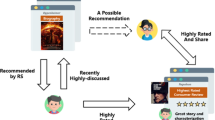Abstract
Social recommendation has become an important technique of various online commerce platforms, which aims to predict the user preference based on the social network and the interactive network. Social recommendation, which can naturally integrate social information and interactive structure, has been demonstrated to be powerful in solving data sparsity and cold-start problems. Although some of the existing methods have been proven effective, the following two insights are often neglected. First, except for the explicit connections, social information contains implicit connections, e.g., indirect social relations. Indirect social relations can effectively improve the quality of recommendation when users only have few direct social relations. Second, the strength of social influence between users is different. In other words, users have different degrees of trust in different friends. These insights motivate us to propose a novel social recommendation model SIER (short for Social Influence-based Effective Recommendation) in this paper, which incorporates interactive information and social information into personal latent factors learning for social influence-based recommendation. Specifically, user preferences are captured in behavior history and social relations, i.e., user latent factors are shared in interactive network and social network. In particular, we utilize an overlap** community detection method to sufficiently capture the implicit relations in the social network. Extensive experiments on two real-world datasets demonstrate the effectiveness of the proposed method.









Similar content being viewed by others
References
Chaney AJ, Blei DM, Eliassi-Rad T (2015) A probabilistic model for using social networks in personalized item recommendation. In: Proceedings of the 9th ACM Conference on Recommender Systems, pp 43–50
Ding J, Yu G, He X, Feng F, Li Y, ** D (2019) Sampler design for bayesian personalized ranking by leveraging view data. IEEE transactions on knowledge and data engineering
Fan W, Ma Y, Li Q, He Y, Zhao E, Tang J, Yin D (2019) Graph neural networks for social recommendation. In: The world wide web conference, pp 417–426
Fang H, Bao Y, Zhang J (2014) Leveraging decomposed trust in probabilistic matrix factorization for effective recommendation. In: Proceedings of the AAAI conference on artificial intelligence, vol. 28
Guo G, Zhang J, Yorke-Smith N (2016) A novel recommendation model regularized with user trust and item ratings. IEEE Trans Knowl Data Eng 28(7):1607–1620
Guo G, Zhang J, Yorke-Smith N et al (2015) Trustsvd: collaborative filtering with both the explicit and implicit influence of user trust and of item ratings. Aaai 15:123–125
He X, Liao L, Zhang H, Nie L, Hu X, Chua TS (2017) Neural collaborative filtering. In: Proceedings of the 26th international conference on world wide web, pp 173–182
Huang L, Ma H, He X, Chang L (2021) Multi-affect (ed): improving recommendation with similarity-enhanced user reliability and influence propagation. Front Comput Sci 15(5):1–11
Jamali M, Ester M (2010) A matrix factorization technique with trust propagation for recommendation in social networks. In: Proceedings of the fourth ACM conference on recommender systems, pp. 135–142
Jiang Y, Ma H, Liu Y, Li Z, Chang L (2021) Enhancing social recommendation via two-level graph attentional networks. Neurocomputing 449:71–84
Lin TH, Gao C, Li Y (2018) Recommender systems with characterized social regularization. In: Proceedings of the 27th ACM International Conference on Information and Knowledge Management, pp 1767–1770
Liu CY, Zhou C, Wu J, Hu Y, Guo L (2018) Social recommendation with an essential preference space. In: Thirty-second AAAI conference on artificial intelligence
Liu H, **g L, Yu J, Ng MKP (2019) Social recommendation with learning personal and social latent factors. IEEE transactions on knowledge and data engineering
Ma H, Jia M, Zhang D, Lin X (2017) Combining tag correlation and user social relation for microblog recommendation. Inf Sci 385:325–337
Ma H, King I, Lyu MR (2009) Learning to recommend with social trust ensemble. In: Proceedings of the 32nd international ACM SIGIR conference on Research and development in information retrieval, pp 203–210
Ma H, Zhou D, Liu C, Lyu MR, King I (2011) Recommender systems with social regularization. In: Proceedings of the fourth ACM international conference on Web search and data mining, pp 287–296
Peng F, Lu X, Ma C, Qian Y, Lu J, Yang J (2018) Multi-level preference regression for cold-start recommendations. Int J Mach Learn Cybern 9(7):1117–1130
Pipergias Analytis P, Barkoczi D, Lorenz-Spreen P, Herzog S (2020) The structure of social influence in recommender networks. In: Proceedings of the web conference 2020, pp 2655–2661
Pirasteh P, Bouguelia MR, Santosh K (2021) Personalized recommendation: an enhanced hybrid collaborative filtering. Adv Comput Intell 1(4):1–8
Rafailidis D, Crestani F (2016) Joint collaborative ranking with social relationships in top-n recommendation. In: Proceedings of the 25th ACM international on conference on information and knowledge management, pp 1393–1402
Rendle S, Freudenthaler C, Gantner Z, Schmidt-Thieme L (2012) Bpr: Bayesian personalized ranking from implicit feedback. ar**v preprint ar**v:1205.2618
Schafer JB, Frankowski D, Herlocker J, Sen S (2007) Collaborative filtering recommender systems. The adaptive web. Springer, Berlin, pp 291–324
Shen Y, ** R (2012) Learning personal+ social latent factor model for social recommendation. In: Proceedings of the 18th ACM SIGKDD international conference on Knowledge discovery and data mining, pp 1303–1311
Taheri SM, Mahyar H, Firouzi M, Ghalebi K E, Grosu R, Movaghar A (2017) Extracting implicit social relation for social recommendation techniques in user rating prediction. In: Proceedings of the 26th international conference on world wide web companion, pp 1343–1351
Tang J, Aggarwal C, Liu H (2016) Recommendations in signed social networks. In: Proceedings of the 25th international conference on world wide web, pp 31–40
Tang J, Gao H, Liu H (2012) mtrust: discerning multi-faceted trust in a connected world. In: Proceedings of the fifth ACM international conference on Web search and data mining, pp 93–102
Tang J, Wang S, Hu X, Yin D, Bi Y, Chang Y, Liu H (2016) Recommendation with social dimensions. AAAI 2016:251–257
Wang X, He X, Wang M, Feng F, Chua TS (2019) Neural graph collaborative filtering. In: Proceedings of the 42nd international ACM SIGIR conference on research and development in information retrieval, pp 165–174
Wang X, Lu W, Ester M, Wang C, Chen C (2016) Social recommendation with strong and weak ties. In: Proceedings of the 25th ACM international on conference on information and knowledge management, pp 5–14
Wei Y, Ma H, Zhang R, Li Z, Chang L (2021) Exploring implicit relationships in social network for recommendation systems. PAKDD. Springer, Berlin, pp 386–397
Wu L, Sun P, Fu Y, Hong R, Wang X, Wang M (2019) A neural influence diffusion model for social recommendation. In: Proceedings of the 42nd international ACM SIGIR conference on research and development in information retrieval, pp 235–244
Yang B, Lei Y, Liu J, Li W (2016) Social collaborative filtering by trust. IEEE Trans Pattern Anal Mach Intell 39(8):1633–1647
Yang J, Leskovec J (2013) Overlap** community detection at scale: a nonnegative matrix factorization approach. In: Proceedings of the sixth ACM international conference on Web search and data mining, pp 587–596
Yang SH, Long B, Smola A, Sadagopan N, Zheng Z, Zha H (2011) Like like alike: joint friendship and interest propagation in social networks. In: Proceedings of the 20th international conference on World wide web, pp 537–546
Yu J, Gao M, Li J, Yin H, Liu H (2018) Adaptive implicit friends identification over heterogeneous network for social recommendation. In: Proceedings of the 27th ACM International Conference on Information and Knowledge Management, pp 357–366
Zhao T, Li C, Li M, Ding Q, Li L (2013) Social recommendation incorporating topic mining and social trust analysis. In: Proceedings of the 22nd ACM international conference on information & knowledge management, pp 1643–1648
Zhao T, McAuley J, King I (2014) Leveraging social connections to improve personalized ranking for collaborative filtering. In: Proceedings of the 23rd ACM international conference on conference on information and knowledge management, pp 261–270
Zhao WX, Li S, He Y, Chang EY, Wen JR, Li X (2015) Connecting social media to e-commerce: cold-start product recommendation using microblogging information. IEEE Trans Knowl Data Eng 28(5):1147–1159
Author information
Authors and Affiliations
Corresponding author
Additional information
Supported by the National Natural Science Foundation of China (61762078, 61363058, 61966004), Research Fund of Guangxi Key Lab of Multisource Information Mining and Security (MIMS1808), Northwest Normal University Young Teachers Research Capacity Promotion Plan (NWNU-LKQN2019-2) and Research Fund of Guangxi Key Laboratory of Trusted Software (kx202003), and Natural Science Foundation of Gansu Province(21JR7RA114).
Rights and permissions
About this article
Cite this article
Wei, Y., Ma, H. & Zhang, R. Social influence-based personal latent factors learning for effective recommendation. Adv. in Comp. Int. 2, 5 (2022). https://doi.org/10.1007/s43674-021-00019-3
Received:
Revised:
Accepted:
Published:
DOI: https://doi.org/10.1007/s43674-021-00019-3




